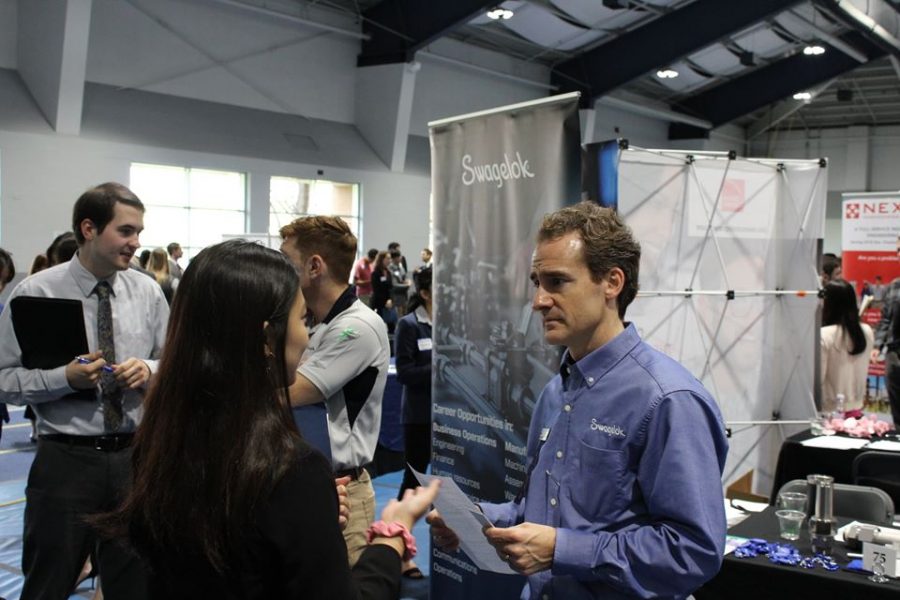Editorial: What about the humanities?
How the Career Fair largely ignores humanities and social science students
February 13, 2020
Career Fair day is easily recognizable—with the swaths of students dressed in jackets, ties and pantsuits. Last Monday, nearly 100 employers set up in the Veale Convocation, Recreation and Athletic Center to meet students interested in their company or industry. While the event helps students network and pursue internship and post-graduate opportunities, it fails to cater to students pursuing degrees outside of engineering.
Case Western Reserve University is a well-known research and STEM oriented institution. More than 30% of graduating students each year are awarded a Bachelor of Science in Engineering, and an additional 11% receive a Bachelor of Science in another field. However, more than 30% of students are awarded a Bachelor of Arts each year. While these degrees do include traditional STEM areas such as biology and chemistry, they are also comprised of English, history, music and international studies.
Yet, the biannual Career Fair caters to students on STEM or business paths, leaving out social sciences and, especially, humanities. An overwhelming number of the employers are scouting engineering students, be it for consulting, manufacturing or research. As a result, many students pursuing disciplines outside of engineering have learned to simply not waste their time attending the fair.
Who is responsible for the lack of diversity in employers? The answer is widely ambiguous, however CWRU—especially the Post-Graduate Planning and Experiential Education Office who host the event—certainly has a responsibility to better recruit alumni and employers from other industries. John Carroll University, Miami University and Cleveland State University all had spring career fairs within the past two weeks, bringing in additional employers from around the country. Surely these schools, known less for their STEM division, had a myriad of employers looking for students pursuing careers in the humanities, social sciences and business. The CSU Career Fair in 2018 featured employers looking for therapists, English teachers and other positions where the skills learned by a humanities and social science majors are a necessity. So the question remains, why were these, or similar, employers not represented at CWRU’s career fair? Is it because CWRU markets the fair to only select industries? Or, is it because of our university’s reputation as a STEM institute?
The Baker-Nord Center for the Humanities, as well as departments within the social sciences and business, all have resources for students within their disciplines. Many departments send out weekly emails and advertise opportunities to meet with professionals. The Office of Post-Graduate Planning and Experiential Education arranges a “finding summer internships” program, directed to promote Humanities@Work, a sponsored program of the Baker-Nord Center that connects humanities students with the professional world. However, these resources should be supplemental to a university-wide fair, rather than the only opportunity—outside of individual research for employers and opportunities—for humanities and social science students to connect with employers to discuss internships and permanent positions.
As there are many students pursuing engineering degrees, it is understandable that CWRU can get distracted in appeasing these prospective employers and industries. However, as long as CWRU wants to continue promoting our other disciplines, they must make a valiant effort to provide comparable networking opportunities. Otherwise, it would seem they are only supporting the unfortunate question uttered to many humanities majors, “what are you going to do with that degree?”
Further, CWRU advertises the Career Fair as an opportunity for students “from all majors.” Unless the university starts to make efforts to bring in other employers to better cater to all students—as they suggest is the case—then they should change the fair to be officially considered what it is—the Engineering Career Fair.
The alternative is to recruit a more diverse set of employers to the next career fair. In the meantime, the university could also promote other local networking opportunities. Playhouse Square, Cleveland’s local theatre district, hosts a career fair in March freely available to anyone upon application. National Career Fairs, a company dedicated to helping connect people with employers, offers a free career fair every two months in Cleveland.
There are certainly employers that would be interested in attending the CWRU Career Fair to meet with humanities, social science and business students. While there are individual programs dedicated to helping these students connect with professionals, this is no reason to largely cut them out of the Career Fair. The University would do well to consult with non-STEM students to better represent their interests at the next career fair in the fall.


